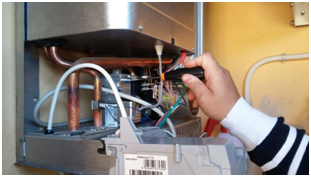If you haven’t done it already, it’s not too late to get your boiler ready for the worst of the winter weather. As long as your boiler is well maintained, this should be a simple and straightforward procedure. Just remember IMOS: inspection, maintenance, operation, safety.

Inspection
Make sure there’s nothing blocking your boiler’s air intakes, and check the burner for any signs of wear and tear. Make sure all pipes are insulated correctly so they don’t freeze during a cold snap. Book an appointment with a qualified engineer who is on the Gas Safe Register to give your boiler a thorough inspection.
Maintenance
First, ensure your boiler has a full and thorough annual service, as this is the best way to keep it running at optimum efficiency. Keep the boiler and its surrounding area clean and free of dust and debris. Check your radiators, and if the heat distribution is not even and they’re not as warm at the top as at the bottom, bleed them. This is a simple procedure that can be done in a few minutes but ensures that there is no air in the system and allows your radiators to work efficiently.
Operation
It’s equally important to inspect your boiler while in operation, and there are three tell-tale signs that you may need to contact an engineer.
Listen: Are there any unexpected noises when the boiler is in operation? Any clangs or knocking noises that don’t sound right?
Smell: When you first light your boiler, you’ll often smell any accumulated dust being burned off, but after that there should be little operational smell. If you smell burning, close down the system.
Look: If the flame isn’t burning a strong blue but appears yellow or smoky, then there’s a problem.
If you encounter any of these problems with your Woking boiler installations, then contact the professionals like http://www.rjplumbingandheating.co.uk/ for a more in-depth inspection and analysis of the problem.
Safety
If you’re a landlord, you have a legal duty to install smoke alarms and carbon monoxide detectors. It’s good advice that all homeowners should follow. Carbon monoxide is a silent killer, and your boiler can become lethal if it develops a fault. Install detectors near sleeping areas and the boiler itself, and test them regularly as part of your boiler maintenance routine.


